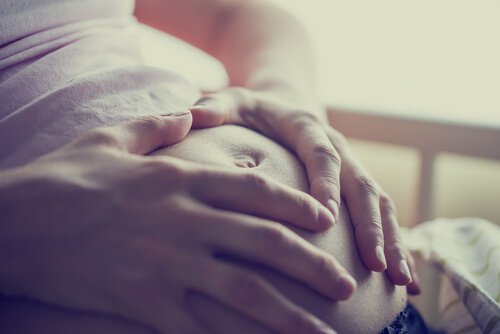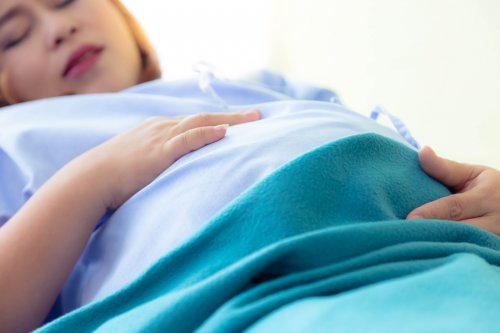The Causes of Renal Colic during Pregnancy

Renal colic during pregnancy can be due to several things. Thus, you must pay attention to the intensity of the pain and other possible symptoms you might experience. It’s always best to consult your doctor so they can conduct the appropriate tests and give you a diagnosis.
In this article, we’ll review the causes of renal colic during pregnancy, both the most common and serious ones. The latter can indicate anything from ectopic pregnancy to premature delivery.
The causes of renal colic during pregnancy
1. Implantation of the embryo
For starters, one of the early signs of pregnancy is renal colic, which can cause the embryo to implant in the uterus. This type of pain usually lasts from one to two days and is similar to menstrual pain.
These kinds of colics can appear in the lower part of the belly way before the time in which the period should have been there. However, they might repeat as the baby grows due to the pressure it exerts on the uterus.
2. Gas and constipation are both symptoms of renal colic

Many physiological changes occur during pregnancy, including slower digestion. This causes swelling and gas accumulation, which can affect a type of colic that isn’t serious.
Also, the intestines move upward as the uterus increases in size during pregnancy. This slows intestinal transit and may also cause pain.
3. Braxton Hicks contractions
Braxton Hicks contractions are frequent in many pregnant women, especially in the second and third trimesters. They’re sporadic and aren’t indicative of an impending delivery, but rather of preparation of the body for when the time comes.
These types of contractions are uncomfortable but painless, although they can intensify as the due date approaches. We can recognize them because they’re irregular and infrequent.
Also read: Exercises to Reduce Feet Swelling during Pregnancy
4. Muscle and ligament pain

As we discussed in the first point, renal colic during pregnancy between weeks 16 and 20 can be due to the pressure of the baby on muscles and ligaments. Specifically, cramps in the round ligament, which is responsible for supporting the uterus.
More than 70% of pregnant women experience this type of sharp, stabbing pain in the lower abdomen. However, it’s usually a mild discomfort that lasts a few seconds or minutes without risk to the baby in most cases.
5. Sex
Sexual intercourse is safe in most cases. However, the doctor may recommend abstaining from it in high-risk pregnancies.
There may also be some colic-type discomfort after sex. In general, it’s mild and doesn’t present risks. However, consult your doctor if they become chronic.
Read also: How to Reduce Bone Pain during Pregnancy
Renal colic in high-risk pregnancies

In addition to the above causes, which aren’t serious in most cases, there are some that do involve health risks such as:
- Extrauterine or ectopic pregnancy where the embryo implants outside the uterus, generally in one of the fallopian tubes.
- Some cases of severe colic accompanied by bleeding may indicate that there’s been a miscarriage, but this isn’t always the case. A placenta that separates from the uterus can be serious.
- The type of renal colic in pregnancy in the upper abdomen is usually preeclampsia. In this case, a pregnant woman may also suffer from high blood pressure and her urine usually contains proteins.
- Pain while urinating is a way to detect a urine infection.
- Placental abruption is a type of colic that’s intense and lingering.
- Preterm labor occurs before the 37th week of pregnancy and involves dilation of the cervix.
Now you know the most common causes of renal colic in pregnancy, as well as those with a higher risk. Don’t hesitate to consult your doctor for any symptoms that don’t go away and come with other discomforts.
All cited sources were thoroughly reviewed by our team to ensure their quality, reliability, currency, and validity. The bibliography of this article was considered reliable and of academic or scientific accuracy.
- Bouyou, J., Gaujoux, S., Marcellin, L., Leconte, M., Goffinet, F., Chapron, C., & Dousset, B. (2015). Abdominal emergencies during pregnancy. Journal of Visceral Surgery. https://doi.org/10.1016/j.jviscsurg.2015.09.017
- Constance, E. S., & Moravek, M. B. (2017). Diagnosis and management of ectopic pregnancy. In Handbook of Gynecology. https://doi.org/10.1007/978-3-319-17798-4_30
- Kilpatrick, C. C., & Monga, M. (2007). Approach to the Acute Abdomen in Pregnancy. Obstetrics and Gynecology Clinics of North America. https://doi.org/10.1016/j.ogc.2007.06.002
- Raines, D. A., & Whitten, R. A. (2018). Braxton Hicks Contactions. StatPearls.
This text is provided for informational purposes only and does not replace consultation with a professional. If in doubt, consult your specialist.








